Peter MALONE
Saturday, 18 September 2021 19:43
See How She Runs
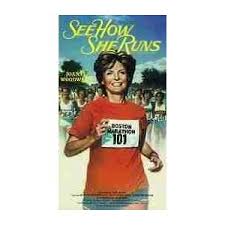
SEE HOW SHE RUNS
US, 1978, 96 minutes, Colour.
Joanne Woodword, Barnard Hughes, John Considine, Lissa Newman.
Directed by Richard T. Heffron.
See How She Runs is an attractive telemovie relying on its success on the performance of Joanne Woodward. At the age of 47, she portrays Betty Quinn, a forty-year-old divorced school teacher with two teenage daughters. She begins to jog and enjoys running and is compelled to keep running. She uses the Boston Marathon as a goal for success and achievement - even just to finish. Despite difficulties of training. criticisms from her family, the difficulties of schedules and practising, she runs and takes all day but nevertheless finishes.
As a picture of ordinary heroism by an ordinary person, the film will have great appeal to the televison audience - and possibly encourage many to exercise and some vigorous vitality. The film was made in Boston and uses the background of the 1977 Boston Marathon. Joanne Woodward performs well and attractively and gets good support from Barnard Hughes as her father and John Considine as her rather immature husband. One of her own daughters, Lissa Newman, is the elder of her two daughters in the film. The film has a rather portentous score, more appropriate for a costume epic. However, the film is a very popular one and was released in theatres around the world.
1. An appealing film? For what audience? Qualities as a telemovie?
2. The kind of audience response desired? From the adult and middle aged audience, from women? Family audience? From an audience viewing the film within the home context?
3. The American presentation and its universal application? The presentation of Boston, the city locations, homes and school, the water, the roads, the environment?
4. The technical effects: colour photography, the collage of images from the marathon, the presentation of running sequences, the marathon itself and the use of editing? The portentous score?
5. The film’s presuppositions about health, exercise? The value of exercise,the strenuous effort, success? Its being right for people who enjoy it? For middle-aged people?
6. Joanne Woodward's performance as Betty? her personality? The carrying of the film? Audience identification especially by middle-aged women? Seeing her in the school context, her relationship with the various teachers, their friendliness, the black school teacher and the continued help and support, the kids in the classroom, the discussion about geography and exotic places, the present of the T-shirt and her wearing it during the marathon, their presence at the end? Betty's relationship with her husband, the alimony situation, interest about his girl friend, preparing the girls for the outings, the problems of getting the cheque in on time? Her being together with him, helping him? His wanting to come back and the various devices he used, her needing time to think? Her love for her daughters, their rather self-centred attitudes and demands on her, the various crises in their needing her support (the older daughter and the drinking, the cooking and the budgeting), her being able to help her daughters and discuss things readily (the discussion about periods)? Betty and her father and the light that this threw on her character and devotedness?
7. Presenting her as a middle-aged woman, age, weight, doing the shopping, walking, being puffed out? The visit to her father and listening to his complaints? The decision to run, the humorous attitudes of the people at school, having to get a taxi home, the continued jogging, the encounter with the woman with the dog, the people calling out to her? The jogging becoming more serious and her enjoying it? Her daughters' attitudes? The frightening sequence in the dark with the car pursuing her and her going to her friend, the importance of the night attack and its repercussions for her? Her daughters going on skates and bike wimi helping her? The effect of greater success in money?
8. The driving motivation for her running, a sense of achievement, the change in her personality? Coming to terms with her life and future?
9. The character of her father, his being confined in the chair, his painting T.V. shows, his compliment to her in the park and saying she ran like a man, the compliment to her mother and his not having said it, his watching her on the marathon?
10. The build-up to the marathon and her decision to run, the final training, her presence at the race and the support of her family?
11. The picturing of the race, the authentic background shots, people involved, audience knowledge of the difficulties especially the hills, the wall? Betty and her running, the support of the people, husband and daughters along the way, the teachers and their support, the blister, her falling? The croyd at the end, her endurance and not realising what was going on, the support of the black man’s betting, the policeman? her running towards the tape and the appropriateness of the film ending with this?
12. Themes of being alive and active, change in life, facing up to reality, values of self and achievement, family, self help? How is this illustrated in the character of Betty Quinn, in her relationship especially to her family?
Published in Movie Reviews
Published in
Movie Reviews
Tagged under
Saturday, 18 September 2021 19:43
Send Me No Flowers
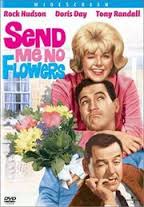
SEND ME NO FLOWERS
US, 1964, 100 minutes, Colour.
Rock Hudson, Doris Day, Tony Randall, Paul Lynde, Hal March, Edward Andrews, Clint Walker.
Directed by Norman Jewison.
Send Me No Flowers is the third and final teaming of Rock Hudson, Doris Day and Tony Randall. They made a big impact in 1959 in Pillow Talk and then in 1961 in Lover Come Back.
This was the kind of film that Doris Day was making in the 1960s – with Cary Grant in That Touch of Mink, with Rock Hudson in Do Not Disturb and The Glass-Bottom? Boat, with Richard Harris in Caprice.
Rock Hudson gets a diagnosis that is not his – a hypochondriac who believes that he is dying and decides to find a new husband for his wife, Doris Day. However, she becomes very suspicious and suspects the worst.
This is popular entertainment, misunderstandings, happy endings. Rock Hudson was to continue to do this kind of film with other stars including Gina Lollobrigida in Come September and Strange Bedfellows, Claudia Cardinale in Blindfold and A Fine Pair.
This was the third film to be directed by Norman Jewison. He also directed Doris Day in The Thrill Of It all, with James Garner. He was to go on to direct many films over the coming decades, quite a range from Fiddler on the Roof to Jesus Christ Superstar to Agnes of God to The Hurricane. Three of his films were nominated for best film Oscars: In the Heat of the Night, A Soldier’s Story, Moonstruck.
1. How entertaining a comedy? Observation on human nature? Rock Hudson/Doris Day comedy and the tradition and expectations?
2. Popular audience enjoyment of this kind of American domestic comedy? the conventions of the presentation of of husband and wife, home life, relationships, risk to the marriage? Friendly neighbour, doctor? How were these presented ? conventiontionally, ironically for the theme of hypochondria and marriage? The quality of this Doris Day comedy within the context of her other films?
3. Colour photography, home locations? Music and songs? The credits?
4. How credible was the plot? Was this important? The emphasis on George and his hypochondria and the consequences of this? The impact on Judy? Power and his arrival and the threat to the marriage? The complications and mix-ups - especially with the doctor? Do audiences accept basic plot implausibilities for the entertainment value?
5. Rock Hudson’s style as George? The initial presentation of his hypochondria at home, his work, his visit to the doctor and misunderstanding about his death? The satire in his imagining his illness In terms of TV commercials? His decisions about Judy, his jealousy, the humour of his involvement with the neighbour about to be divorced and Judy’s reaction? His relying on Nash? The complications and his handling of them? A Conventional American husband character? poked fun at? the contrast with Judy and Doris Day as the all American wife? Pandering to her husband's whims? Involved in farcical situations? being locked outside etc.? Her relationship with the neighbour, trying to cope with George’s idiosyncracies, her jealousy and the threat to the marriage? Her pretence at the end that all was not well? The humour of it the mutual deception and forgiveness?
6. Nash and the good neighbour, his presence in the neighbourhood, sharing the interests of the family, the humour of his compassion for George and his drinking? His being involved in the marriage complications?
7. The character of the doctor and his ability to deal with George, the humur of the mix-ups, of his arrival back with the fish, his being blamed,, helping with the solutions?
8. The humour of these crises as inflated by comedy? How much insight into marriage relatlonships jealousy?
9. The humour about hypochondria, the indication of the title, the poking fun at the soft American husband? Of the modern pill-popping generation?
10. The character of Power and Clint Walker as the other man the ambiguous humour and audience enjoyment of this?
11. Is thare any more value than sheer lighthearted entertainment in this kind of domestic Americana?
Published in Movie Reviews
Published in
Movie Reviews
Tagged under
Saturday, 18 September 2021 19:43
Sensualist, The / Turk's Fruit
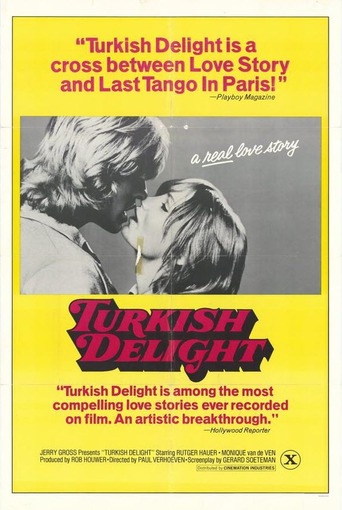
THE SENSUALIST (TURK’S FRUIT)
Holland, 1973, 112 minutes, Colour.
Monique van de Ven, Rutger Hauer.
Directed by Paul Verhoeven.
The Sensualist was the Dutch nomination for Oscar for 1973, best foreign language film.
This is a very strong Dutch film, the story of a sculptor, his coming across a photo of the woman he once loved, flashbacks to illustrate the intensity of their passion, physical, psychological, erotic.
The film develops the life of the couple over several years, the love, the clashes, the separation.
Rutger Hauer was a strong Dutch star at this time and was to move to the United States in the late 1970s with such films as Hearts and Armour and then Nighthawks with Sylvester Stallone. He made his first big international impact in Blade Runner.
The film was directed by Paul Verhoeven who made a number of films in his native Holland, becoming one of Holland’s leading directors. His significant films include Spetters, Soldier of Orange and The Fourth Man (written by the present screenwriter Gerard Soeteman). After making Flesh and Blood, he had a career for almost twenty years in the United States with such striking and memorable films as: RoboCop, Total Recall and, of course, Basic Instinct. He received ridicule for Showgirls. Starship Troopers became something of a cult science fiction film. He returned to Holland in 2005 to make a film memoir of the Resistance in World War Two, Black Book.
1. Did the title give the appropriate meaning to the film and its themes? The title of the original novel was Turk’s Fruit.
2. Was it evident that this was a Dutch film? Is there a Dutch touch about the film that makes it different from films coming from other countries? If so, where? Is this to its advantage or disadvantage? What was the intention of the initial opening and its impact? How shocking was it meant to be? Did the film intend to shock its audience continually?
3. Why was it shocking? Did this opening shock permeate the whole film? How shocking was the hero in his brutality, sexuality and violence? The murder sequences? Was this in any way alleviated later by the fact that it was
the hero’s imagination rather than reality? Did this make a great difference?
4. Did you like the hero at any time? Did he have any good qualities and strengths? What were his worst qualities? How selfish was he, how brutal? How besotted with sex and violence? His room asn an image of himself? His work and artistic work? His capacity for loving and hating? His reaction to his employers?
5. The banquet and its hypocrisy? The horses eyeing the food? His being sick and destroying the party? His anarchy? Was it a genuine anarchy or was it studied? Was he meant to represent 20th century man? Was he an Everyman figure? Was he the young revolutionary?
6. Did you like the heroine? Her reaction to being picked up? The violence of her sexual rapport with the hero? The importance of the accident? Its effects on their lives?
7. When did the hero begin to change? Was it love for the girl? Their life together? Did she bring out any qualities that he did not know were there? Or was this a normal change in settling down? Did he have any sense of responsibility? Did she?
8. The importance of the heroine’s mother and father? The contrast of values? The generation gap? The possessiveness of the mother and her hypocrisy? The liaison with the manager of the shop? The father and his benevolence? The genial figure? Was he hypocritical at all? What values did the parents stand for?
9. The importance of the wedding sequence? The hypocrisy of the mother? Was this meant to be a comment on the hypocrisy of society and weddings? The genuine love of the father? The effect of the wedding on the hero and heroine? Any effect? The sexuality associated with the wedding both before and after?
10. The hero’s art after the wedding? Its non-conventional nature? His appreciation of his wife? The significance of the Queens coming to open the monument? Their behaviour? Was this genuine or was it studied?
11. When did the heroine begin to change? The effect of the child? What was the effect of the heroine’s erratic behaviour on the hero? why? Was he hurt?
12. The significance of the dinner sequence? The wife flirting with another man? The hypocrisy of the parents? The hero’s being sick over the mother? Emotional response to this?
13. Why did they both go to pieces? Was there anything to hold them together? What was the meaning of this disintegration?
14. The importance of the sequence of the father’s death? The emotional effect on the hero and his genuine sorrow and confrontation with death? Did it have the same effect on the heroine? Why? The effect on the mother?
15. Why the divorce? How did the mother show that she was vindictive and pleased about the divorce? What had gone wrong with the heroine? Did the hero want a divorce or not? why?
16. Did the divorce and all that preceded it explain why the hero went beserk as pictured at the beginning of the film? Was his behaviour then less shocking? why? What of the witfe’s new role? Her mental collapse? The way that the sequence in the cafeteria was handled? What was your emotional response to her behaviour?
17. Was her death sequence too romantic and sentimental? The effect on the hero? Did this fit in with the rest of the film? His final walk on the beach? Its significance? Did this fit in with the rest of the film? His future?
18. The film dealt very much with the physical, the body and its functions - especially its excremental functions. What was the overall impact of this physicality on the audience and its emotional response to this? Did the film have a pessimistic view about bodiliness and sensuality?
19. Was this a successful glimpse of modern realism with old fashioned sentimentality? Or was it a failure? What do you think was the purpose of the film's being made? For what audience? Was it an important film in its physical breakthroughs? Or was it merely a shocker for shock’s sake?
Published in Movie Reviews
Published in
Movie Reviews
Tagged under
Saturday, 18 September 2021 19:43
Serail
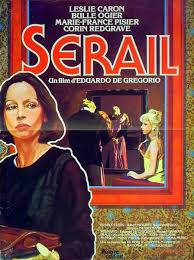
SERAIL
France, 1976, 86 minutes, Colour.
Leslie Caron, Bulle Ogier, Marie- France Pisier, Corin Redgrave, Marilyn Jones.
Directed by Eduardo de Gregorio.
Serail is an unusual film, a blend of fantasy and realism. Corin Redgrave portrays a novelist who comes across a mansion in France. At his first visit, a young woman, played by Bulle Ogier, shows him around. When he returns, he finds a different woman who denies the existence of the first. She is played by Marie-France? Pisier. Leslie Carol portrays the older woman.
The novelist feels that there is the possibility for a novel in this experience. He buys the house – but the two women have different intentions for him.
The film was directed by Argentinian-born Eduardo de Gregorio who had made Celine and Julie Go Boating. He made comparatively few films but was a lecturer at the New Sorbonne in Paris.
1. The impact of the film, enjoyment, interest, meaning? To what genre did it belong? Romance, the mysterious?
2. The particular characteristics of the film as French? French sensibilities, emotions? French style? The use of colour, Panavision? The atmosphere of the interiors of the house, the exteriors and their contrast - the fields, the gardens, the airport? The importance of light and darkness. shadow? Atmosphere of reality and unreality? The atmosphere of the musical score? How important was style for communicating atmosphere and suggesting meaning?
3. How did the plot work on the level of realism? The introduction of the novelist, his comments, his observations, the audience hearing these and assessing the situation and the people with him? His search for a house, his fascination with the house, the people and their behaviour? The particular events that he experienced in chronological order? The interest level of the plot at ita level of realism?
4. How much of the film was dream or fantasy? The novelist himself and his creative imagination, the house and the way that he may it, the people and the rooms and the way that he interpreted them, the way that he responded to them with his feelings? The events as part of a dream? How well did the film work for the audience on the level of fantasy?
5. Could the audience identify well with the character of the novelist? Corin Redgrave’s appearance, background. style? An an Englishman in France? As a man of the imagination, yet commercial success, physical and sensual? His response to the house despite the difficulties of its location and the airport? His fascination with the women? The differing response to each? His curiosity about the rooms, the persons, the stories? The compulsion to search and to create a new novel? The power that the women had over him, sexuality and sensuality, his infatuation? His involvement in the plots, the stories of the past, his plans? His seeming to be in control and searching and yet his being the victim of the women? What really happened to him?
6. The two young women in terms of realism? Their background, characters, acting? What really happened? Their interaction with each other, with Celestine, with the novelist? The women in the fantasy and their various acts, to aspects of femininity? Their plotst behaviour, sexuality? Their stories? What happened to them at the end?
7. Celestine as seeming realistic and yet also mysterious? Her place in the house, the pictures of her in the past, the stories about the ownership and her place there? Her possession of the house, her hold over the two women? Her hold over the novelist? Her age, seeing her at work, her advice? How mysterious a person really was she?
8. How important was the dialogue and the discussion for exploring the themes? The strengths of the dialogue, indication of mystery about human nature?
9. The importance of the physical appearance of the house, its rooms, the sense of presence of the house and its significance? As a character in the film?
10. The reliance of the film on symbolic actions?
11. To what purpose was the film made? An exploration of sensibility, of human nature, of human relationships, people and environment?
Published in Movie Reviews
Published in
Movie Reviews
Tagged under
Saturday, 18 September 2021 19:43
Sergeant Matlovich Versus the US Air Force
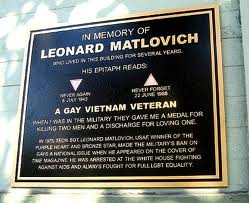
SERGEANT MATLOVICH VERSUS THE US AIR FORCE
US, 1978, 100 minutes, Colour.
Brad Dourif, Ellen Holly, Harrison Page, Donald Moffat, Bill Duke.
Directed by Paul Leaf.
A serious telemovie with a message. Based on the experience and the court case of Leonard Matlovich, it shows a conflict as regards the presence of a professed homosexual in the armed services. Matlovich came out in 1975 and this film shows his story, his motivation, the reaction of the Air Force and the subsequent losing of his case. The film is an obvious plea for understanding of homosexuals and presents its case, within the legal context. seriously and very discreetly. It emphasises the basic human elements rather than any sensationalising of issues. Because of this, it is a very helpful film to see for understanding of the basic issues.
The film has a good cast and is led by Brad Dourif, of One Flew over the Cuckoo's Nest and Wise Blood, who shows the development in character of Matlovich during his experience in the Air Force. It is a great skill of the film that it can present such serious material designed for the home television audience.
1. An interesting film, entertaining, social message, current affairs?
2. How well did the film gear its theme and its treatment to the home television audience? The impact of telemovies - especially with social theme? Adapting the material of the court case and Matlovich's life to the home audience? The wide audience? Making it acceptable for viewing, retaining interest. persuading an audience to consider the issues? What was the audience left with?
3. Audience presuppositions about homosexuality in itself, homosexuals, rights, behaviour? Legal issues, moral issues, security issues, educational issues?
4. The structure of the film: the introduction of Matlovich within the context of his court case, the development of the proceedings and their dramatic momentum? Intellectual understanding, emotional involvement? The staging of the various flashbacks and their revelation of Matlovich's character, background, struggles, crises, skills, patriotism? How well did they blend with the development of the court case?
5. Matlovich in himself his American and family background, the presentation of his mother and her being upset. his father's reaction and coming to visit him and support him, the Air Force background? His growing up, his experience of school. work? His desire to be in the Air Force, his skills, seriousness, combat in Vietnam, injury, friendship with the padre? His puritanical reactions to the men's treatment of women, his fears? The realization of homosexuality - his revelation of this, his desperation? His continued skill at work, race relationships, training the men? His decision after psychiatry and counselling? His handling of the case, his crusading, his preparedness to make his case public? The repercussions for himself? How did the.audience respond to him, judge him throughout the various stages of the film?
6. Audience interest in the case, the establishing of the jury and their arrival, their being tested, the dismissal of the various aspects? The officials and their attitude and problems? The book and its regulations? Security and morality? The attitude of the lawyers for and against?
7. Matlovich's own attitude during the court case, the support he received from his mother's phone call, his father's visit? The importance of the testimonies - from friends, colleagues? Attesting to his character, skills? The importance of the psychiatrists and their psychological background, testimony to Matlovich's balance? The importance of his own speech and comments on law and morality? The importance of the summation and the issues of justice, Army regulations, personal pleas?
8. The importance of the flashbacks and how they were handled - the drama within them, the revelations of various characters? Their impact on Matlovich: his mother and his relationship to her, his date and the saying of the Rosary, basketball practice and his enjoyment of sport, his involvement in race relations programmes, his experience in Vietnam and the encounter with the prostitutes, his friendship with the priest (and his sternness yet welcoming attitude)? The friendship with Jason, the fights, his attitude towards the rules and his strictness, the discussions with the priest and his continued invitation to open himself? The importance of his letter, the presence at the graveside, the mission and the mine injury? His hospitalisation and the visit from his father? His way of illustrating prejudice and prejudice against blacks to the trainees? The emergence of the homosexual interest, realisation? The importance of the death of the priest and the closing of an avenue of self-exploration? The walk down the street and the Gay bar? The telling of Jason, his rejection and the temptation to suicide, Jason's return and friendship? The visit to the bar, the friendship. the humane aspects of male to male friendship? Jogging, reading and training? The visit to the psychologist, her feminine support in his problem? His decision to write the letter? The presentation of the letter and its rejection? His decision to be involved in the case?
9. The finale of the film, their losing of the case, the question of rights, law and morals, responsibility? The value of telemovies like this for informing the public emotively about crucial social issues?
Published in Movie Reviews
Published in
Movie Reviews
Tagged under
Saturday, 18 September 2021 19:43
Sergeant Pepper's Lonely Hearts' Club Band
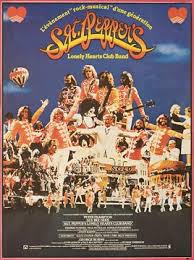
SERGEANT PEPPER'S LONELY HEARTS' CLUB BAND
US, 1978, 113 minutes, Colour.
Peter Frampton, Barry Gibb, Robin Gibb, Maurice Gibb, Frankie Howerd, Paul Nicholas, Donald Pleasence, Steve Martin, Aerosmith, Earth Wind and Fire, Alice Cooper, Billy Preston, George Burns. Cameos: Keith Carradine, Carol Channing, Barbara Dickson, Donovan, Randy Edelman, Yvonne Elliman, Jose Feliciano, Leif Garrett, Barry Humphries (Edna Everage).
Directed by Michael Schultz.
Sergeant Pepper’s Lonely Hearts Club Bans is a conglomeration – perhaps over-rich for all the ingredients. The film is based on the Beatles album though the presentation of the songs is not by the Beatles themselves (although Paul McCartney? and George Harrison appear in cameos towards the end).
The film has the familiar story of the local band, feted by the music business, caught up in its machinations – with the need to discover its roots and to be able to play authentically.
The film is interesting in having the Bee Gees in a film about the Beatles as well as musicians and groups like Aerosmith and Peter Frampton.
The film was directed by Michael Schultz, a prolific television director who had the opportunity to make a number of films in the later 1970s, especially with African American themes: Car Wash, Greased Lightning, Which Way Is Up, Scavenger Hunt, Bustin’ Loose and Carbon Copy.
1. The appeal of the film? To whom? For Beatles fans, for Bee Gees and Peter Frampton fans? For the general audience? For lovers of Beatles music? For people who like musicals? The response to the stars? To the style? How successful a film, musical?
2. The Robert Stigwood production? The atmosphere of Saturday Night Fever, Grease and popular response to these musicals? The investment of money on a contrived musical illustrating the Beatles' albums?
3. The critics were very severe on the film and it did not do well at the box office. Why?
4. Comment on the large budget and the way that this could be seen on the screen - Panavision, colour, score, sound? The sets both real and fantasy? The special effects? The imagination? The editing? The guest stars? How well did these combine for effect and enjoyment?
5. The impact of the stars - Peter Frampton and his personality, style, singing ability? As an embodiment of the innocent hero? The Bee Gees and their popularity, singing ability? Their performing and acting? The guest stars especially George Burns and Frankie Howerd? The various groups who appeared and contributed to the visualizing of the songs? The significance of the ending with so many popular singers appearing together and singing the title song? The contribution of the personalities of the stars?
6. The reputation of the albums presented? Their popularity in the sixties? Innovative popular music? The reputation of the Beatles in the sixties, their popularity, their individual personalities? Their singing style, musical composition? Their lyrics and their comments on society in the sixties? How relevant the Beatles' music and lyrics for the seventies? Why the popular appeal, the making of this film?
7. The albums and their contents - their origins, the Beatles' imagination and musical tradition? The various songs and the way they were imagined in this film? The plot of this film and its relationship with the Beatles' story - success, innocent singers, the possibility of failure, the possibility of fame and corruption? The effect of the film as a fable, visual and symbol? The use of captions? The highlighting of the moral? Did this presentation of the explicit attitude of the film to the audience work?
8. The opening with the presentation of Sergeant Pepper ? World War I and the re-creation of the war, the passing over the various generations and using the musical styles of the decades to illustrate Sergeant Pepper and his band? The build-up to his death in the fifties? The monument? The transition to the contemporary scene? The new Sergeant Pepper's Lonely Hearts' Club Band? Audiences identifying with a Sergeant Pepper over the decades and anticipating the new band?
9. The presentation of Heart Land - the dream town, the ordinary American town with its pleasantness and niceness? As a symbol of middle America? The focus on Mr Kite as the Mayor? George Burns and his personality and style? Carnival, joy, lyrical innocence, the boys and the girls - even Dougie? The transition to the lure of success, the moving away from Heart Land? The taking over of Heart Land and its corruption and transformation by Mr Mustard? The ugliness of the corrupt Heart Land - the casino, the rubbish on the streets, the hints of degradation? The need to be rescued and the overtones of The Yellow Submarine as the band comes to transform Heart Land back into its initial innocence?
10. Peter Frampton as Billy - type, clean-cut, young? The new leader of the band? His heritage? His place in the town, his relationship to the boys, Dougie and the explanation of his background as the manager money-making type? His love for Strawberry Fields? His fitting into the niceness of Heart Land. his relationship to Mr Kite? The songs illustrating this?
11. The presence of Broadhurst and his Californian style, dress, appearance? His contact with the group? The transition to Los Angeles and the world of the media, parties, record sessions, money, concerts? The songs illustrating this area of the plot?
12. How good was the musical skill of Peter Frampton, of the Bee Gees, of the other singers? In comparison with the original Beatles' presentations of the songs?
13. The transition to Mr Mustard? The songs illustrating his character especially the mean man? Frankie Howerd and his British comedy style, his leering at the audience and drawing the audience into complicity? The kidnapping of Strawberry Fields? The humour and fantasy and overtones of science fiction with his computer, robots? Lust, meanness, corruption, kidnap? The stealing of the instruments? The fact that he could transform Heart Land but would ultimately be defeated?
14. The world of stardom? Comment on the captions used to illustrate the meaning of what was happening? The response of Billy and his friends to stardom, Dougie and the money? The stealing of the instruments and the effect on them?
15. The presentation of the range of enemies - the groups and stars who performed as the villains? The songs from the original albums illustrating villainy? What were the targets of attack with the various enemies? Father Sun, the song and the television? Mr. Maxy, Edison and his operations? The future villains?
16. The songs in Los Angeles, Lucy in the Sky with Diamonds and the place of Broadhurst's chauffeur? The irony of Dougie and Lucy stealing the money? The contrast with the innocence of Strawberry Fields?
17. The build-up to the final confrontation, the success of the music, the benefit and the transformation of Heart Land. but the death of Strawberry? The ugliness of the confrontation where Strawberry died?
18. Billy and his grief, its seeming to be hopeless, the role of fantasy and the angel singing Get Back? The background of Billy and his memories and response to Strawberry? The contrast with the songs illustrating their loving at the beginning of the film?
19. How important were the special effects and their appeal? Involving the audience in a world of fantasy?
20. Looking at the list of songs from the various albums, comment on how well they contributed to the plot, to the delineation of character. The way they were visualized, the symbolised to illustrate them, their place in the fable? How well did all this work?
Published in Movie Reviews
Published in
Movie Reviews
Tagged under
Saturday, 18 September 2021 19:43
Sergeant Rutledge
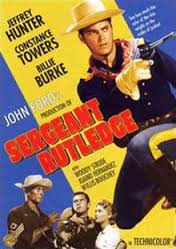
SERGEANT RUTLEDGE
US, 1960, 111 minutes, Colour.
Jeffrey Hunter, Constance Towers, Woody Strode, Billie Burke.
Directed by John Ford.
1. Did the title give the proper focus of attention for the film? The significance of the songy Captain Buffalo. during the credits and the explanation of the song at the end and its reference to Sergeant Rutledge?
2. Comment on the effectiveness of the structure of the film. Did the flashbacks fit into the court structure of the film? Did they come at appropriate dramatic points?
3. Was the film chiefly a courtroom drama or a western? Why?
4. How interesting was the film as a court drama? Was there sufficient conflict in the case? A hero whose life was at stake and drew our sympathy? Verbal dramatics appropriate to court sequences?
5. How good a western was the film? the court sequence and the questions involved enhance the impact of the typical western material? Indian chases? The behaviour of Sergeant Rutledge, the behaviour of Cantrell etc? How did the western story add to the dramatic impact of the court sequence?
6. What kind of person was Sergeant Rutledge in himself? Was he too upright a character? Was he too much a black figure and symbol in the film? Where was audience sympathy for him?
7. What did the film have to contribute on race relationships? The relationship of white and black and prejudices? The relationship of whites and Indians? Indian Reservations and white pursuits? The black in relation to Indians? Indians seeing blacks as black white men?
8. Comment on the attack on the lynching attitude of white Americans in the west - the men in the court, Rutledge's fear of telling the truth because as a black he was doomed automatically? The women in the court?
9. What picture of western society did the film give, especially in the opening sequences at the court? the men, the women chattering, eager for a trial, their reaction at being sent out? The picture of the town, the people, the shop, the murdered family and their relationship with people, the Army?
10. Was Cantrell a sympathetic figure? hero for the film? How did he embody Army values? How did he illustrate the life of an Army on an outpost in the west? The train ride, his relationship to Mary, to Rutledge, his involvement in the chasing of the Apaches, the decisions he had to make about Rutledge during the chase? Cantrell’s living by the book? Why did he take on Rutledge’s case? How well did he handle the court scenes and his opposition?
11. The contribution of Mary to the film? As a heroine? Her relationship to Sergeant Rutledge and the revelation of the truth? The gradual build-up of her story and audience sympathy for her, identifying with her view of Rutledge? Her contribution in the court?
12. Fosgate: and his running of the court? was it fair? Was he prejudiced? (The humour of his drinking tlwaterll, his attitude towards his wife?)
13. The Prosecutor, Shaddick: was he fair in his working on the case? How prejudiced was he? Where was this most dramatically felt?
14. The character of Mrs. Foagate - representing society in the west? The foolishness of the absent-minded woman ? White prejudices in ordinary people?
15. Was the denouement too melodramatic? Did Cantrell have the right as he did to produce a confession? Did the real identity of the murderer contribute to the meaning of the film or not?
16. How American was the film? What feelings of patriotism and self understanding would the film have aroused in Americans? Why?
17. Did the film descend to sentimentality at any time? The opportunities were there - in attitude towards Rutledge, towards blacks, the hero and Mary and their romance? Or did the film successfully avoid this? Did the film help in the understanding of human nature and behaviour.
Published in Movie Reviews
Published in
Movie Reviews
Tagged under
Saturday, 18 September 2021 19:43
Sergeant York
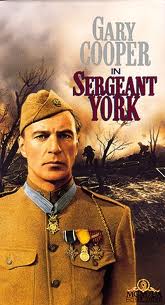
SERGEANT YORK
US, 1941, 134 minutes, Black and white.
Gary Cooper, Walter Brennan, Joan Leslie, George Tobias, Stanley Ridges, Margaret Wycherly, Ward Bond, Noah Beery Jr, June Lockhart, Dickie Moore, Howard da Silva.
Directed by Howard Hawks.
Alvin C. York was one of America’s First World War heroes. From the backblocks, he was an excellent shooter, sent to the war in Europe as a sniper and sharpshooter. Though a declared pacifist, his experience of the war and its tensions and struggles convinced him that he ought to commit himself to fight for his country.
Gary Cooper won the first of his two Oscars (the other for High Noon) for this performance. Walter Brennan as the pastor was also nominated for best supporting actor (but had already won three of them by this stage). Joan Leslie is charming as Gracie Williams. Margaret Wycherly has a strong role as York’s mother (a great contrast to her mother of James Cagney in White Heat).
The film was directed by Howard Hawks who by this stage of his career had directed quite a range of genres including comedy with Bringing Up Baby, aerial action with Only Angels Have Wings, comedy with Ball of Fire. He was to go on to direct a number of classic films, also with a wide range, including Red River, Gentlemen Prefer Blondes and Rio Bravo.
1. Impact of the film now? During 1941? Gary Cooper’s Oscar? Why is the film now considered a classic?
2. The film was directed by Howard Hawkes, a director of action films. How well wore the action sequences treated? how well did Hawks communicatate war and religious issues is picture of America at the time of World War I?
3. The war framework for the film? the first World War being remembered during the second World War? Audience response to war and its issues? The importance for America and its entry into World War its understanding of its own principles, its purpose in joining World War II? Themes of American religious consciousness and conscience? The impact of these issues now? How have the ideues changed?
4. The theme of patriotism throughout the film? The demands of patriotism on every American, no matter what his background? How important.is it to be an American? To be an American in war? The heroism of the war hero as was Sergeant York?
5. The importance of the black and white photography, the presentation of Tennessee and its landscapes and variety, the way of life of the second decade of the 20th century? and its landscapes and beauty, the way of life of the second decade of the twentieth century, country and southern life, the contrast with soldier training, the war of the trenches, the city? The impact of Sergeant York himself? As a real hero of America? As portrayed by Gary Cooper and the particular quality that Gary Cooper brought to the portrayal? Betting him In his ordinary way of lifeg a rowdy young man, in his place and in his times e.g. hie drinking, his work. his ambitions to buy land? The tenderness of his relationship with his mother? With his sister? His love for Gracie? Comment on the presentation of emotional relationships and audience response to these. How attractive a heroine was Gracie? As a girl of WM£11e and the time? Her love for Alvin York? His dedication to her, her being a motive for his ambitions? The significance and buildup of the turkey shoot? As an enjoyable incident in itself, as revealing York's character, his motivations for Gracie? The bottom land, his visiting it, his surveying it with Gracie and their hopes?
8. The presentation of York in his reputation, his style of life, the opinions of the various people in the town? Their opinion of him?
9. The dramatic importance of Pastor Rosier Pile? As meeting him in his preaching and in ministry, his particular style of old-time religion, singing, simple faith in God? His religious principles and the guidance of the township? His shop, the way of life of the people who went to his shop? The travellers and visitors?
10. The buildup to the important sequence of Alvin's conversion? His drinking, the atmosphere of the storm, his being frightened, his hearing the hymn, the entry into the church, the emotional. buildup, the immediacy of the conversion, the pastor and his people and their response, the beginning of the full conversion?
How religiously was this sequence presented? How convincing as a genuine religious experience?
11. The sequence of the training for war, the loneliness of York away from his home and family? The transition from his mother, sister and household, the town and Gracie and the way of life amongst the soldiers? The comedy and the serious side of the training for war?
12. The importance of the issues of war and his principles of non-violence? His analysis of American history and his reading the book, the issues of violence and non-violence? The importance after the scenes of warfare for his reasons? To stop the killing rather than to kill people? How were these principles put into practice during the actual trench sequences, the deaths of his friends, the devices he used in order to lure the Germans and capture them? How credible were the action scenes for showing the heroics of Sergeant York?
13. The background of the characters and friends in the army? Pusher, the various deaths and their impact on Alvin York?
14. How important were the various decisions that he made about his own role in the war, the achievement and his success? People's reaction to this?
15. The significance of the New York sequences, the celebration, the decorations, the offers for advertising, the commercialisation of his success, his explanation of his principles and beliefs, his yearning for being back home?
16. How appropriate was the happy ending, the train arriving at home, meeting his mother, finding Gracie and seeing their home and the land they possessed? The vision of American achievement and success? How particularly American was the film in its exploration of war and values?
Published in Movie Reviews
Published in
Movie Reviews
Tagged under
Saturday, 18 September 2021 19:43
Seven Alone
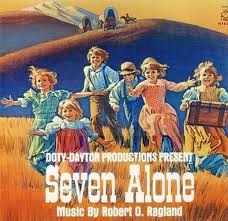
SEVEN ALONE
US. 1974, 97 minutes, Colour.
Dewey Martin, Aldo Ray, Anne Collings, Dean Smith, James Griffith, Stewart Peterson.
Directed by Earl Bellamy.
Seven Alone is a film directed towards a family audience. It is set in the early 1840s, portraying a family travelling from Missouri to Oregon. The father then dies from blood poisoning after an Indian attack. The mother also dies. The wagon train decides to send the children back to Missouri. However, one of the boys who is considered lazy decides to lead the children through the mountains to complete the journey.
This is American heroism, geared for a family audience and for a young children’s audience, providing them with examples and ideals.
1 . For what audience was this made? Children, family, Americans, non-Americans?
2. A glimpse of America in the 19th. century? A re-creation of a period? How well was it researched and portrayed? Of historical as well an entertainment value?
3. How particularly American was the style? Adapted for family viewing? A parallel with the Disney live action style? Differences?
4. The importance of the events being part of a true story? The authenticity and sense of realism? Sense of history, names and dates?
5. The importance of the introduction of the Missouri settings, colour? The farm and its poverty, the family and their way of life? The house, the continued moving, the father and his hard work and exasperation, the mother and her bearing children, rearing them? The symbolism? The importance of the father’s dreams and the mother not sharing them but being carried along with them?
6. How well delineated were the characters of the parents? The personality of each and their relationship with one another, pioneers, coping and not coping, their relationship with their children? The father's dreams and the mother’s reactions?
7. The film’s focusing on John? His tricks with his brother, the tricks with his sisters and their falling out of bed? John and his sullenness, the beating? What chance of growing up well did the boy have? His strengths of character, weaknesses?
8. The sudden sighting of the wagons, the visualising of drum, the trek to Oregon? The hopes of Oregon, of farm life, of prosperity? The way of making decisions and the family going with the wagon?
9. How interesting were the incidents in the life of the wagon train, the importance of the personalities in the group, the families, the guides? The importance of the Shaws? Of the Dutch doctor and John’s reaction to him?
10. John and his being out of place at times in the wagon train, his playing cards and losing the cattle, his going to sleep on the wagon, the importance of Catherine’s accident and the doctor’s helping her and decisions? The doctor helping John’s father, mother? His incompetence, but the primitive nature of the wagon train? The justice of John’s accusations against him? His insulting and hurting the doctor? His mother's lessons about this?
11. The confrontation with the Indian? John running away and the encounter with Kit Carson? The father fighting witli the Indian and his being wounded? His lingering and the significance of his death?
12. The credibility of the mother’s decline, her death? Henrietta as her bequest to John and his keeping the family together?
13. John and the responsibility for the family, his decisions, yet his bullying treatment of the other children? Their reaction to him? How did he keep them going through all the difficulties? The significance of the film's title in reference to the children and their courage and endurance?
14. The significance of Kit Carson, his helping John personally, helping the family? The importance of his later role when they were to settle in Oregon with his help? The characterisation of of Carson and his place in American pioneering legend?
15. The wisdom of the children’s decision to go on to Oregon, the significance of their mistake and finding the group going to California, the Indian leading them to the other group and his death, their courage in going on towards Oregon during the winter? How important were the sequences with the raft? With the animals, with the Indian village and the feeding of the baby, the snow sequences, encountering the group with dysentery? The momentum of each of these sequences within the film, and on the children?
16. John’s pushing them through the snow, their being on the verge of collapse? His going on and the fulfilment of his hopes? The happy ending?
17. How enjoyable, how moving? Audience identification with the children and their quest and endurance? With their characters? The pioneering American values?
Published in Movie Reviews
Published in
Movie Reviews
Tagged under
Saturday, 18 September 2021 19:43
Seven Brides for Seven Brothers
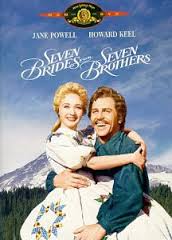
SEVEN BRIDES FOR SEVEN BROTHERS.
US, 1954, 102 minutes, Colour.
Howard Keel, Jane Powell, Jeff Richards, Russ Tamblyn, Tommy Rall, Mark Platt, Jacques D'Amboise, Julie Newmar, Virginia Gibson, Ruta Lee.
Directed by Stanley Donen.
Seven Brides for Seven Brothers is considered one of the major musicals from MGM during the 1950s. It is based on a short story by Stephen Vincent Benet, the adaptation of the rather barbaric story of the rape of the Sabine women in the Roman times.
The film focuses on a farmer who goes into town to court a wife (Howard Keel and Jane Powell). When she returns to the backwoods, she discovers there are six brothers and she decides to train them to some kind of elegance. They read the story of the Sabine women – and decide that they will abduct six brides for themselves. While this might seem a dubious premise, it works out very well (although not in a feminist sense).
The film is particularly colourful, has some popular songs and some very energetic dancers including Russ Tamblyn and Tommy Rall.
The film was directed by Stanley Donen who began his work as a director with Gene Kelly for On the Town and collaborated with him for Singin’ in the Rain. He made a number of musicals at MGM during the 1950s including Royal Wedding, Deep in My Heart, It’s Always Fair Weather as well as Funny Face for Paramount and The Pyjama Game and Damn Yankees for Warner Bros. His films during the 1960s tended to be elegant comedies or mysteries including The Grass is Greener, Charade, Arabesque and Two For The Road. He also directed Peter Cook and Dudley Moore in Bedazzled.
1. Was this good musical entertainment? It was a big hit of the fifties. Does it still make a good impression?
2. What were the best things about this film as musical entertainment?
3. Comment on the effect of this as a dancing musical. Comment on it as a song musical. The sobbin' women, Spring,spring,spring, Goin' courtin'. June Bride, Bless your beautiful hide, The brothers' lament. Comment on the way that many of these songs were filmed e.g. Goin' courtin' and The brothers' lament. The use of actions, rythms, mime?
4. Comment on how the American uses the old Roman story of the Romans and the Sabine women for this American saga. Was it successful?
5. This was a film about the American frontier: outposts, hard work in the west, the lack of women for the men. Even though a light musical, did it show something of the American frontier life?
6. Adam and Millie as a happy couple. Did the film show some insight into marriage and happiness?
7. The brothers, and their unruliness, their being transformed by Millie. What point was being made here?
8. Their courting of the women their rivalry with the town men; the comedy and the reality of the abduction?
9. The happy ending? Appropriate? Why was this a happy musical comedy with point?
Published in Movie Reviews
Published in
Movie Reviews
Tagged under